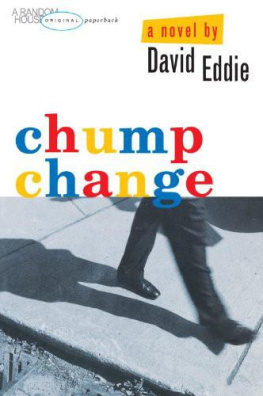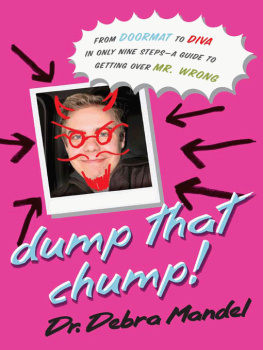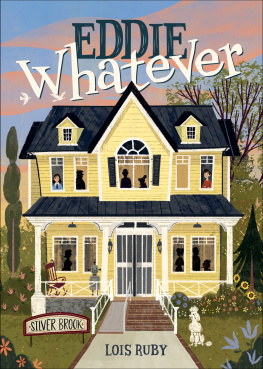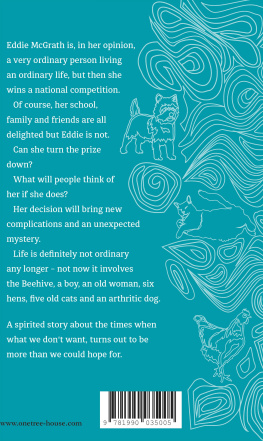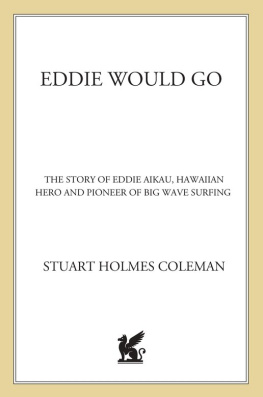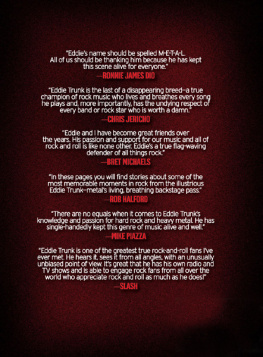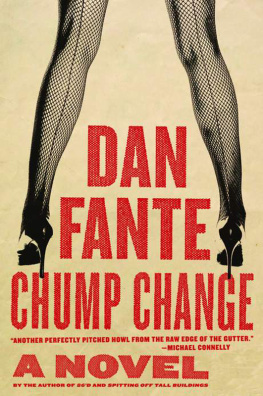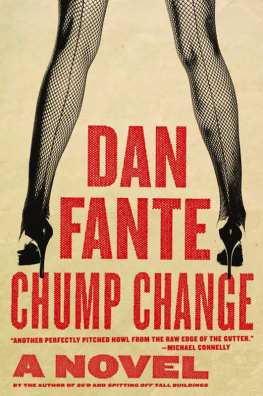David Eddie - Chump Change
Here you can read online David Eddie - Chump Change full text of the book (entire story) in english for free. Download pdf and epub, get meaning, cover and reviews about this ebook. year: 1999, publisher: Riverhead Trade, genre: Detective and thriller. Description of the work, (preface) as well as reviews are available. Best literature library LitArk.com created for fans of good reading and offers a wide selection of genres:
Romance novel
Science fiction
Adventure
Detective
Science
History
Home and family
Prose
Art
Politics
Computer
Non-fiction
Religion
Business
Children
Humor
Choose a favorite category and find really read worthwhile books. Enjoy immersion in the world of imagination, feel the emotions of the characters or learn something new for yourself, make an fascinating discovery.
- Book:Chump Change
- Author:
- Publisher:Riverhead Trade
- Genre:
- Year:1999
- Rating:5 / 5
- Favourites:Add to favourites
- Your mark:
- 100
- 1
- 2
- 3
- 4
- 5
Chump Change: summary, description and annotation
We offer to read an annotation, description, summary or preface (depends on what the author of the book "Chump Change" wrote himself). If you haven't found the necessary information about the book — write in the comments, we will try to find it.
David Eddie: author's other books
Who wrote Chump Change? Find out the surname, the name of the author of the book and a list of all author's works by series.
Chump Change — read online for free the complete book (whole text) full work
Below is the text of the book, divided by pages. System saving the place of the last page read, allows you to conveniently read the book "Chump Change" online for free, without having to search again every time where you left off. Put a bookmark, and you can go to the page where you finished reading at any time.
Font size:
Interval:
Bookmark:
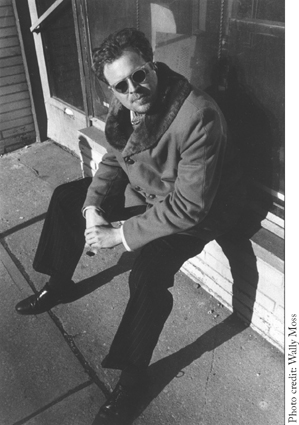
David Eddie was born in Boston in 1961, and has lived in the Philippines, England, Hungary, and Canada. He is a graduate of the Columbia School of Journalism and has worked as a reporter for the East Hampton Star, letters correspondent for Newsweek magazine, a TV newswriter for the CBC, and as a film extra. He has written for several publications, including Saturday Night, Toronto Life, Books in Canada and Flare. He is currently a weekly columnist for Hamptons magazine and a book critic for Global TV. He lives in Toronto.
Man of Letters
I am a failure.
Dont get me wrong, I say this without bitterness, without self-hatred, without irony. Also without pride, in case youre wondering about that. I state it as a fact merely, without editorial comment. It happens, thats my attitude. Nature tosses out all kinds of variants and crazy experiments to try their luck in the planetary battle for survival. Some succeed, some fail. The ones who fail die off or, at least, become bachelors-for-life, their branch of the evolutionary tree withers and dies, and they are never heard from again. The ones who succeed, on the other hand, establish an ecological niche dropping out of trees on unsuspecting birds, snaring fish in their poisonous tendrils, or, in the case of our own species, practising law. They feather their nests and pass the genetic torch off to healthy, robust offspring.
Whats the secret of their success? In other words, whats the secret of success on planet Earth?
It is the ability to adapt.
And I have failed to adapt; to my milieu, to my culture, and most of all, to my century. Everything about this century frightens me. World wars, nuclear weapons, concentration camps, global warming, desertification, the hole in the ozone layer, the Internet, Madonna, computers, credit cards. Sometimes I wish Id been born in an earlier, simpler time. Of course, I wouldnt want to go too far back, to the Middle Ages, say, when everyones hair was alive with lice and they died at 30 and had sex with all their clothes on. No, Id only want to go back 100 years or so, to late 19th-century England. That sounds like my kind of time and place, with its gas lamps, horse-drawn hansoms, twice-daily mail service. Naturally, Id have to have been born into a wealthy, titled family. Oh, yes, that goes without saying. The poor had it rough in the 19th century, and the only serfing I ever want to do is high atop a gnarly wave off the coast of Cali or Oahu, not in a loincloth, following an ox down a furrow on some feudal estate, shagging my ass back to the lean-to and my little serfin girl.
Lord Davington. Lord Davington of Fleet. That has a nice ring to it, dont you think? Your morning coffee, Lord Davington. Why thank you, Cheevers, just set it on the settee. Oh, and Cheevers? Yes, mLud? Will you set out my punting clothes? I have a date on the Cam this aft with the Countess Veuve-Cliquot.
But those are just pipe dreams, cloudy figments in the crystal ball of my imagination. Itll never happen, not to me anyway.
I had such high hopes for myself, too, growing up. Wanted to be a writer and all that. After remaining an inordinate amount of time in school getting not one but two Masters degrees in an orgy of academic overkill, leaving my old man practically in a barrel I finally emerged at age 27, heavily in debt, and headed to Manhattan to realize my grandiose dreams of literary superstardom.
My plan was simple. Shack up with my grad-school sweetheart Ruth, get a job, write on the side, and through a combination of luck, talent, and personal charm, soar straight to the top of the literary heap. I gave myself two, three years tops; after that, I would be toasted, I would be fted, I would ride everywhere in a limousine, starlet on either side of me, laughing and spilling champagne as we rode through the bumpy streets of the West Village on our way to the latest club or black-tie-only gala. On a typical day, dawn would find me half-asleep in a fountain, still in my tux, a half-full bottle of champagne bobbing in the water at my elbow, a smile playing on my lips. By noon Id be brunching with my publisher in some chic uptown restaurant, discussing international rights and screenplay options. At dusk, Id collect my tux from the cleaners, and begin the whole round of celebrity-crammed parties all over again.
Needless to say, it didnt work out that way. In Manhattan, I was burned, but never toasted; I was fetid, but never fted. I didnt realize my dreams there, but life was dreamlike. Wandering alone in a mob of strangers, pursued by some nameless dread, suddenly someone surges out of the crowd brandishing a pair of shoes, a fork, a piece of cheese on the end of a stick. What do you want? you want to ask, but no words emerge from your lips. Later, you wake up in a cold sweat and realize: Oh, I see. He wanted to sell that to me.
Like Madonna, I got off the bus at Times Square with about $50 in my pocket, big ambitions, and no talent or marketable skills. Unlike Madonna, though, I didnt become one of the most famous people in the world. Instead, I sank like a stone straight to the bottom of society.
My third day in the city I got a job at Newsweek magazine, in the letters department. Writing letters back to people who write in to the magazine, according to the card on the journalism school job-board. Well, I can handle that, I thought. Its not getting published, but at least its practice. In those days I looked at everything in terms of how my future biographers would view it, and this seemed like a good fit: Upon arriving in Manhattan, David Henry took a lowly job as a letter-writer for Newsweek magazine. Little did anyone realize that during these years he would develop the epistolary style for which he would later become so famous.
The card on the job-board also said the job title was Letters Correspondent, but that wasnt quite true, either. Ill never forget my first day. A little wall-eyed elf named Donna a ten-year Newsweek veteran is showing me the ropes, taking me over to see the various points of interest, including the largest bank of filing cabinets Ive ever seen. There must be 500 drawers.
Damn, thats a lot of filing cabinets, I say.
Yes, she says thoughtfully, almost to herself. Theres quite a bit of filing on the job, more than most of us would like to admit, really. Hence the clerk in the title, I guess.
Clerk? What do you mean?
Thats your job title, didnt you know? Letters clerk.
So its come to this, I thought. After all my teen cheese-dreams of champagne-soaked limo rides and cocaine-dusted parties, this is the reality: I am a clerk. I may even have muttered it to myself to see how it sounded: I am a clerk.
Oh, well, I said to myself. I wont stay long at this job. Just a few weeks, until I get on my feet.
I stayed nearly a year and a half.
The job didnt have much to do with writing letters, either. Even in that humble expectation I was cruelly deceived. There were twelve of us in the letters department, all with advanced degrees, all sitting in two rows of desks in a room on the seventh floor of the world-famous Newsweek building on Madison Avenue, and what we mostly did all day was type addresses on postcards.
Newsweek gets about 1,000 letters a week, from all over the world. A few VIPs former astronauts, congresspersons, presidents of large countries or corporations received personalized replies to their letters, drafted by one of us, the letters clerks, edited and approved by Madeleine Edmonds, the letters editor. People with unusual comments or requests received one of
Next pageFont size:
Interval:
Bookmark:
Similar books «Chump Change»
Look at similar books to Chump Change. We have selected literature similar in name and meaning in the hope of providing readers with more options to find new, interesting, not yet read works.
Discussion, reviews of the book Chump Change and just readers' own opinions. Leave your comments, write what you think about the work, its meaning or the main characters. Specify what exactly you liked and what you didn't like, and why you think so.

